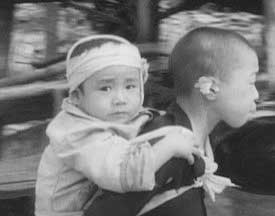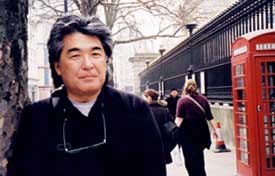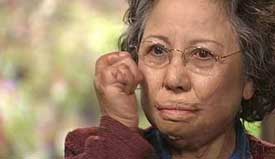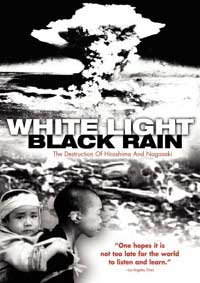 When as many of the facts as are permitted to be known are known, I don't see how any reasonable human being could conclude that the bombing of Hiroshima & Nagasaki was justified.
When as many of the facts as are permitted to be known are known, I don't see how any reasonable human being could conclude that the bombing of Hiroshima & Nagasaki was justified.
The claim is many American lives were saved by bringing the war to a sudden end thanks to a twin act of terror that has never ceased to have repurcussions.
But the weight of evidence is that it was a hurried attack because it was well known that the Japanese were already preparing through diplomats to sue for peace, & the American military didn't want to lose the opportunity of showing the Russians what those rat-bastard commies had damned well better fear.
We have the absolute evidence of history that any nation -- any nation -- that has a weapon no other nation has, they will use it first & foremost. To an extent, then, it's a good thing Russia soon had the atomic bomb because if America had been able to keep this a nationally proprietary technology, our nation would've been sprinkling atomic & hydrogen bombs around the world pretending "to save American lives."
The American government had gotten so happily adjusted to targeting predominantly Japanese civilians & levelling entire cities with firebomb attacks, it was really no great leap of inhumanity to keep doing so. The only difference it was done with two super-bombs instead of thousands of regular ones.
 That states my feelings on the matter. Japanese American documentarian Steven Okazaki's White Light/Black Rain: Destruction of Hiroshima & Nagasaki (2007) attempts what seems to be a crazy "balance" making no clear statements about right or wrong, & letting every excuse or justification go unquestioned or uncorrected.
That states my feelings on the matter. Japanese American documentarian Steven Okazaki's White Light/Black Rain: Destruction of Hiroshima & Nagasaki (2007) attempts what seems to be a crazy "balance" making no clear statements about right or wrong, & letting every excuse or justification go unquestioned or uncorrected.
Through man-in-the-street interviews in modern Hiroshima & Nagasaki (reminiscent of Jay Leno's "Jay Walking" in revealing the average citizen's lack of even the most rudimentary knowledge of anything beyond the doings of pop celebrities) we find that young Japanese people know next to nothing about the atom bombs.
The dates of the destruction of two cities meaning nothing to them. And alas, we have to assume that yet another documentary on the topic will educate nobody who was not already interested in the subject, so let's all look forward to it: Those who forget the past are doomed to repeat it.
Here are the statistical realities: 210,00 were vaporized in Nagasaki & Hiroshima. Another 160,000 died slowly from burns or radiation sickness. Unknown thousands more died much later of blood or bone cancers. Eight-five percent of those immediately killed were civillians.
It is a slow-paced but powerful documentary, with interviews of fourteen survivors at the heart of its intensity. There's a good dose of merely factual information in the corners of this documentary, but the strength of it is in the survivor interviews, aged & severely scarred people remembering their childhood, the loss of their families, the years of medical attention.
Among those interviewed were Keiji Nakazawa, creator of Barefoot Gen, the internationally successful manga comic book series unveiling his experiences as a survivor when he was a small boy. There's Kiyoko Imori the one & only survivor of an elementary school, speaking through tears; "Why didn't I die?" she wonders, & answers her query, "To tell people."
Katsuji Yoshida speaks as an activist from his scarred face, still angry even at his own government for starting a war & then making the civilian victims lifelong outcasts. We meet Dr. Shuntaro Hida who was one of the first doctors to treat survivors & continued to treat them for the rest of his life.
And Shigeto Sasamori, one of the "Hiroshima maidens," macabrely beautiful with her scarred & terribly imperfect facial reconstruction & twisted remnant of fingers. She wonders if she would have married & had children & lived a normal life if she hadn't been burned by that bomb at age thirteen.
And there's the survivor testimony of Sakue Shimohina who laments that memories of being with her family at age six have faded with years, but the pain & fear of that time remains. "Even now I cannot say my sister's name out loud. It hurts too much."
In all there are fourteen voices selected from among 100 interviewed. Plus portraits of injuries at time of the destruction, & thick scars of survivors today, scarcely required accompanying testimony.
 One of the survivors I remembered from what may be my earliest understanding of the injustice of war.
One of the survivors I remembered from what may be my earliest understanding of the injustice of war.
Early television was an amazing window onto the world with many moments that would stick in my mind from childhood. One of the sickest things I ever saw on television as a child was an episode of the usually-fluffy series This is Your Life which was so strange to see excerpted in White Light/Black Rain.
I was only five years old when it first aired, so perhaps it got rerun a couple years later, as I have an awfully clear impression of the episode presenting the biography of Captain Robert Lewis, co-pilot of the Enola Gay which dropped the bomb on Hiroshima. And I'm sure a five year old couldn't remember as much of it as I did, but who is to say; it's something I have thought about a few times a year since early childhood.
After some regular stuff about life & family, the producers of This is Your Life trucked out the Reverand Kiyoshi Tanimoto with members of his family, survivors from Hiroshima. The documentary doesn't tell the background to Rev. Tanimoto's appearance on this show, as he had no advanced warning that this was happening, it was like an especially sick episode of Punked.
He'd been brought to the set by Norman Cousins moments before the show went on the air, & had not told him what sort of show he was going to be on, let alone that with his family gathered around him he was going to come face to face with the man who dropped an atom bomb on his city & his family.
So you may think modern "reality" programs & game shows that induce people to eat live bugs or trashy talkshows that permit lunatics to reveal the terrible secrets of their dysfunctional lives have are the worst that television has ever had to offer; & in decades past it was much less viciously ignorant & inhumane.
But it turns out that even in the medium's early days, producers of leading shows were sleezebags who would spring just about anything on innocent bystanders for the sake of ratings.
One of Rev. Tanimoto's family members was a little girl, Koku Tanimoto-Kondo, who was in her mother's arms when the house collapsed around them, pinning her mother to the floor with Koku underneath her.
Her mother regained conscioiusness to the sound of her little girl weeping. Finding she could not move, & could barely breathe, she called out timidly, "Help! Help!" hoping someone would come, but no one came. She squirmed & squirmed & inch by inch found her way through a tiny opening, pulling her child & herself from the rubble before the spreading fires reached their ruined home.
Koku's earliest memories in life are of being carried by her mother past people who were burnt & disfigured, faces of living people having melted off so that teeth grinned without mouths to close on them. When she was old enough to understand what had happened, she swore to herself that she would one day track down the pilot of that airplane "to give him a big punch."
On May 11, 1955 she would have her opportunity on This Is Your Life. Her father, a Christian minister, had arranged a trip to America in order to bring a group of disfigured girls to obtain plastic surgery so that they could regain something resembling faces. These twenty-five girls became famous as "the Hiroshima maidens."
It was only by Norman Cousins' duplicity that her father was invited on the television program & brought his family. Koku, by then aged ten, finally saw the co-pilot, one of the men she had hated for as long as she had memories.
The sight of her & her family caused the drunken melancholy Captain Lewis to weep. He claimed that at the exact moment he saw an entire city vaporized, with all its civilian population, he said to the pilot, Theodore "Dutch" Van Kirk, "My God, what have we done?" By contrast, "Dutch" went to his grave proud of what he'd done.
Koku did not punch, but forgave Captain Lewis that day, & grew up to be one of Japan's most famous peace advocates. And if I end my asides & my review of Steven Okazaki's incredible documentary at this point, it's really because I cannot bare to say more.
copyright © by Paghat the Ratgirl
|

